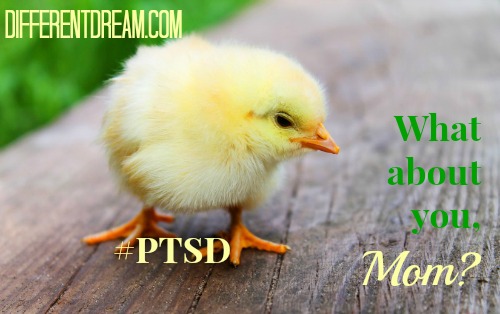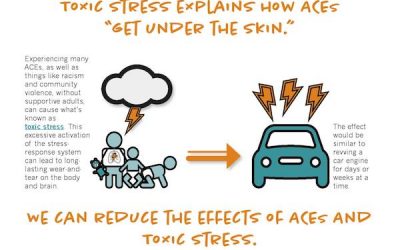Special Needs Parents and PTSD: What About You, Mom?

What About You, Mom?
A few hours after our first child’s birth in 1982, he was life-flighted to a hospital 750 miles away for life-saving emergency surgery. For the next 4 years, my mother hen instincts were absorbed in caring for my little chick. Life felt like a revolving door as my husband and I watched him go in and out of the doctor’s office, in and out of the hospital, in and out of surgery way. That revolving door left very little time for self-examination or working through the trauma I had experienced after his birth.
So I shut the door to my emotions and kept them safely under lock and key for years–even decades–after our son’s health stabilized. Those emotions remained stuffed away until 2008 when our son, then 26, was treated for PTSD caused by all the early, invasive medical trauma he had experienced.
I was sitting in the trauma clinic’s waiting room minding my own business when one of the therapists stopped by to visit about our son’s progress. After confirming that our boy was progressing well, the therapist looked me in the eye and asked, “What about you, Mom?”
I had no idea why he was asking the question. “I’m fine,” I replied, puzzled.
He raised a quizzical eyebrow. “Is that so?”
For several years I ignored his question whenever it niggled in my brain. But then last fall, something happened to someone I love dearly, and that event unlocked the door to my emotions. Long hidden emotions came tumbling out. Once again I felt as alone and weak and helpless as the day the doctor took my newborn baby away. I felt stuck in the past, unable to move beyond the constant sense of worry and loss surrounding me.
I described my feelings to my sister, a mental health counselor. “You went through a lot when your baby was born,” she confirmed. “And you never processed your emotions. I think some Eye Movement Desensitizing and Reprocessing (EMDR) therapy might help you.” She did some online research and sent contact information for several therapists in our area and advice about dealing with our insurance. A few weeks later, I scheduled my first of several weekly appointments with a compassionate and skilled therapist. A few months later, she said we were done.
By then we’d become friends. I was sad to say good-bye to her, but I knew she was right. I no longer felt stuck. I could think about the early days and years of our son’s life and maintain an emotional distance that kept me from getting sucked back into them. Leaving her office for the last time, I resolved to share my experience with other parents of kids with special needs so they can find help and process their emotions soon after soon after they are traumatized.
If you think special needs parents and PTSD are living side by side in your life, I urge you to seek treatment. Follow these steps to find a therapist:
- Ask your insurance company for a list of mental health therapists in their network.
- Identify therapists on the list who have specialized trauma training.
- Check them out on the internet.
- Call their offices and ask them about their trauma training and therapy techniques.
- Make an appointment with a therapist that best matches your needs.
- Go to a few appointments. If you see red flags or don’t feel comfortable find a different therapist. But if you see progress, keep going until you’ve worked through your emotions.
So What About You, Mom?
That’s my story, and that’s my advice. But before signing off, let me ask you a few simple questions:
What about you, Mom?
What about you, Dad?
What about you?
What about you?
Part 2: Special Needs Parents and PTSD–What About You Mom?
Part 5: PTSD in Parents–Moving from Negative to Positive
Part 6: PTSD and Special Needs Parents: 5 Ways to Prepare for Healing
Part 7: PTSD in Parents of Kids with Special Needs: Visualization as a Coping Tool
Part 8: Newborns Feel Pain: The Headline that Almost Triggered My PTSD
Part 10: Why Kids with PTSD Need Mentally Healthy Parents
Part 11: PTSD and Special Needs Parents: Calling it Like It Is
By Jolene
Jolene Philo is the author of the Different Dream series for parents of kids with special needs. She speaks at parenting and special needs conferences around the country. She’s also the creator and host of the Different Dream website. Sharing Love Abundantly With Special Needs Families: The 5 Love Languages® for Parents Raising Children with Disabilities, which she co-authored with Dr. Gary Chapman, was released in August of 2019 and is available at local bookstores, their bookstore website, and at Amazon.
4 Comments
Trackbacks/Pingbacks
- Special Needs Parenting, Trauma, & PTSD | Special Connections - […] http://differentdream.com/2015/04/special-needs-parents-and-ptsd-what-about-you-mom/ […]
Submit a Comment
Subscribe for Updates from Jolene
Related Posts
The ACEs and Toxic Stress: Implications for Children with Special Needs?
This infographic shows the relationship between ACEs and toxic stress. This relationship has implications for our children with special needs.
Preventing PTSD: 11 Things To Do If Your Child Has Been Through Trauma
Preventing PTSD in children who have experienced trauma is possible. Lydia Jenkins, D.O. Pediatrics offers 11 strategies for parents to use.
More Than Words: The Freedom to Thrive After Trauma
The author of More Than Words: The Freedom to Thrive After Trauma explains why she wrote the book and how she made a heavy topic easy for readers to digest.






Thank you, Mardra!
Thank you for that helpful information, Karen. I’m so glad it is helping you and would like to hear more about it.
Yes. Excellent point and post. I’ll be sharing this. 🙂
I use EFT (emotional freedom technique) and NET (neuroemotional technique) to neutralize traumas. I find EFT helpful when the trauma is happening, and I’m getting worked up. I find NET helpful for past happenings.